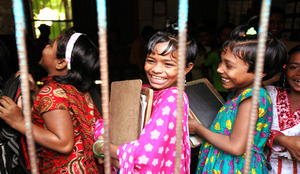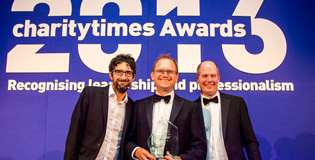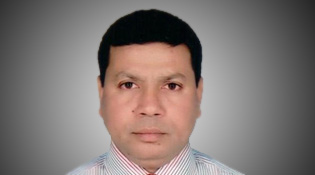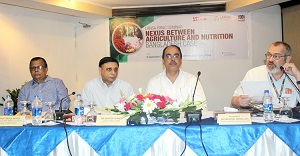
English (961)
Children categories
Winner of 2016 Financial Reporting Awards
BRAC Uganda has been recognised for its excellent performance in financial reporting. We received the award in the NGO category at the 2016 Financial Reporting (FiRe) Awards, which took place on 10 November 2016 at the Kampala Serena Hotel.
We have been recognised every year since the awards were launched in 2011. This year, we competed against 20 other NGOs. The awards also recognise entrants from various industries including financial institutions, consumer and industrial products, education institutions, insurance services, the public sector and regulatory bodies and associations.
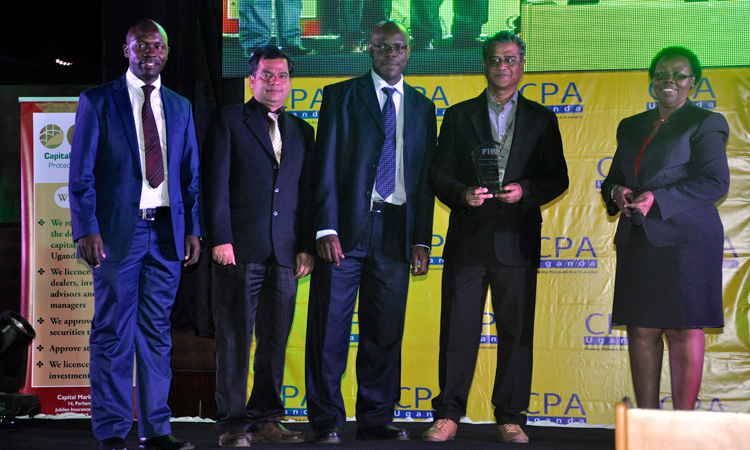
(Left to right) BRAC Uganda finance manager, Ronald Kasozire, accounts manager, Sachindra Ghosh, chief finance officer, Richard Kigozi and country representative, Bhuiyan Imran from BRAC received the award.
As one of the largest development organisations in the country, serving over four million people and employing over 2,400 Ugandans, we are engaged in poverty alleviation initiatives that include, but are not limited to, microfinance and small enterprise development, community healthcare and nutrition, agriculture and seed distribution, education and youth empowerment and livelihood programmes. We have established reporting systems to ensure transparency and enable successful implementation of our multi-sectoral programmes. These also ensure that we adhere to international financial reporting standards. It encourages more organisations to embrace quality financial reporting to improve their operations and comply with application financial reporting frameworks.
The FiRe Awards aims to promote financial reporting in compliance with international standards set out by the International Accounting Standards Board. It is organised by the Council of the Institute of Certified Public Accountants of Uganda, Uganda Securities Exchange and the Capital Markets Authority.
Opinion: A vote for the world's health, absent from the headlines
Calls for Innovations to reinvent our Cities
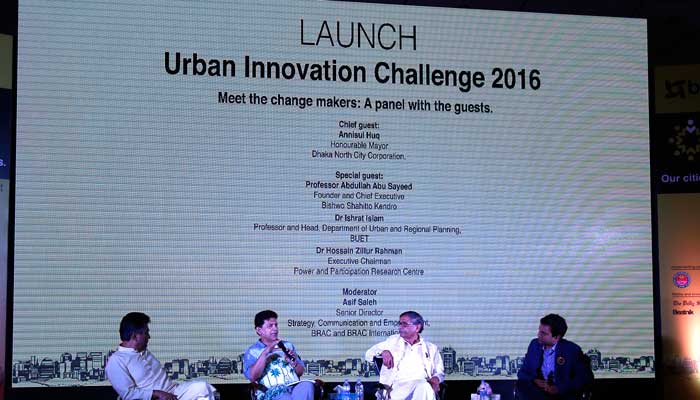
BRAC launches Urban Innovation Challenge 2016
BRAC launched a competition today to find solutions to the growing challenges faced by people living in cities across Bangladesh. The Mayor of Dhaka North City Corporation (DNCC), Mr Annisul Huq, launched the Urban Innovation Challenge at the Bangabandhu Sheikh Mujibur Rahman Novo Theatre. The Mayor hailed the initiative as a major milestone in Bangladesh’s progress in urban development, saying “Compared to other countries, Dhaka is more densely populated. 140000 people live per square kilometer. We are struggling to find a better solution for managing the street hawkers and transport problem of the city. So I would urge the urban innovators of our country to come up with innovative and inclusive solutions for these. Mayor’s office will be happy to take those ideas.”
Urbanisation in Bangladesh has accelerated rapidly in the past few decades. This is having drastically negative effects on health, transport and employment. Dhaka is the 9th most densely populated city in the world, and around1100 migrants arrive in the city every day.
BRAC has initiated the year-long challenge to create a platform to work with innovators, young entrepreneurs and university students to improve life in cities across the country. The goal is to find the best ideas in Bangladesh and support innovators to build them into sustainable social enterprise models. The challenge will focus on three specific problem areas: health, transportation and informal sector employment.
Potential challengers must submit their applications by November 30. Shortlisted applicants will then be asked to submit full proposals, and a high-profile jury will select 4-5 winners. Winners will build their prototypes and test them in the field with BRAC from April- August 2017. They will receive mentoring, skills development and support, as well as a grant amount up to BDT 5 lac and linkage to potential investors.
Executive Chairman of PPRC Dr Hossain Zillur Rahman praised the initiative at the panel discussion, saying, “The solutions have to be specific from the user’s perspective. But at the same time it has to be comprehensive keeping both the megacity and the towns in mind.”
The panel also included Professor Abdullah Abu Sayeed, founder and chairperson of Bishwo Shahitto Kendro. He said, “Dhaka is a city of immense possibilities. We need to think about our cities by ourselves. Our youth have possibilities, talent and ideas, we can guide them making those into reality.”
Young entrepreneurs speaking at the event included the founder of 10 Minute School, Ayman Sadiq, and founder of Identity Inclusion, Shamsin Ahmed, who spoke on entrepreneurship in a session titled “Udbhaboner Golpo.”
Partnering for the Urban Innovation Challenge are Shout-Daily Star for youth engagement, Radio Shadhin for radio engagement, Beatnik for digital engagement and IDEO.ORG for knowledge management.
This initiative is a part of BRAC’s newly launched urban development programme which focuses on improved service delivery, mobilisation and governance.
BRAC Manthan Digital Innovation award announces 14 winners

BRAC Manthan digital Innovation award announced 14 winners for 2016 on 8 October,at the Radisson Blu Dhaka Water Garden. The award was given to promote and recognise the contributions of individuals and organisations in the field of ICT for development.
The programme started with a fair exhibiting the innovations of 29 finalists. Zunaid Ahmed Palak, State Minister, Minister of State for Information and Communication, Technology (ICT) attended the event as chief guest. Appreciating this initiative he said, “Current internet user in our country is 60 million and this is increasing by 10 million per year. With the increase of internet users, interest of youth in technology is also amplifying. This award will certainly inspire the youth to innovate in technology. The government is ready to cooperate in taking this initiative forward. “
BRAC launched this award, an off-shoot of the Manthan Awards in India, on 10 April in partnership with Digital Empowerment Foundation (DEF). The winners from Bangladesh will get direct entry to the final round of prestigious Manthan Award South Asia 2016.
The nine categories of the competition are: e-business and financial inclusion, e-education, learning and employment, e-agriculture and ecology, e-governance and institutions, e-health, e-women, inclusion and empowerment, e-news, journalism and entertainment, e-culture, heritage and tourism, and m-content.
BRAC received more than 100 nominations from all over the country, across different sectors. Based on 90 applications went for the jury evaluation process. A jury of 10 eminent experts assessed them on the quality of their content, impact of the solution, functionality of the product/service and benefits to people. 29 were selected for the final phase.
Notable jury board members included Anir Chowdhury, policy advisor, Prime Minister’s office, Luna Shamsuddoha, Chairman, Dohatec New Media, Munir Hasan
Coordinator, Youth Programme -Prothom Alo, KAM Morshed, Director, ICT and Advocacy, BRAC etc.
Present at the award ceremony, founder and director of Digital Empowerment Foundation Osama Manzar said, “Internet and technology are the connecting tools now, if we dont use these we will become the consumers of someone else. So Bangladesh should plan for the next 100 years not 100 days and try to build the network combining internet and technology”. Executive director of BRAC Dr Muhammad Musa, representatives from development agencies, government and corporate sector also attended the programme.
Prothom Alo supported this initiative as the associate partner. Also on board were Friedrich Naumann Foundation for Freedom as exhibition partner, Webable as digital media partner and Channel 24 as TV media partner.
Winners list
Category: E-AGRICULTURE AND ECOLOGY
Department of Agriculture Extension project name is
KRISHOKER JANALA-APNAR FOSHOLER SOMOSSAR SOMADHAN EKHANEI
Category: E-EDUCATION, LEARNING & EMPLOYMENT
Repto education Center
10 MINUTE SCHOOL
Youth Opportunities.
Category: E-BUSINESS AND FINANCIAL INCLUSION
Humac Lab Limited and their project name is SELLISCOPE
Cloud Solution Limited and their project name is CSL MOBILE ACCOUNTS
Category: E-CULTURE, HERITAGE AND TOURISM
Vromon
Dhaka Electronica Scene/Akaliko Records their project name is TRANSLATIONS – AN ELECTRONIC MUSIC COMPILATION BY AKALIKO RECORDS.
Category: E-NEWS, JOURNALISM AND ENTERTAINMENT
Software Shop Limited (SSL Wireless) their project name is e-Tunes
PAVILION and their project name is PAVILION.
Category: E-GOVERNANCE & INSTITUTIONS
EnamelBD and their project name is VAT CHECKER
Mathiura Union Parishad and their project name is Mathiura Union Parishad Digitalization Project.
Category: E-HEALTH
Rx71 Limited and their project name is RX71
Department of Biomedical and their project name is Dhaka University Telemedicine Programme – rural healthcare using indigenously developed technology.
Special mention and runners up
Category: E-AGRICULTURE AND ECOLOGY
Special mentions
Grameen Intel Social Business Ltd and their project name is MRITTIKĀ
Bangladesh Agricultural Research Institute (BARI) and their project name is BARI Application.
Runner up
Training in a Tab
Category: E-EDUCATION, LEARNING & EMPLOYMENT
Special mention
Durbin Labs and their project name is Durbin App
Clickntech.com and their project name is e-learning door to door
Category: E-BUSINESS AND FINANCIAL INCLUSION
Runners up
eSheba Organization a company of Curtex Group and their project name is eSheba.
Category: E-CULTURE, HERITAGE AND TOURISM
Runners Up
KOTHOWAIN and their project name is Marginalized and Ethnic Children and Youth Development and Empowerment Project.
Category: E-NEWS, JOURNALISM AND ENTERTAINMENT
Special Mention
QUIZARDS.
Runners up
The Dhaka Times
Roots Journalism
Category: E-WOMEN, INCLUSION AND EMPOWERMENT
Special Mention
Women in digital Bangladesh.
Runners up
Concern Universal and their project name is People Centered Interactive Risk & Livelihood Information Gateway
Preneur Lab - Public Toilet App and their project name is Public Toilet App – Find public toilets.
Category: E-HEALTH
Runner up
Windmill Infotech Limited and their project name is babytika
Juror’s Mention for Innovation
From the category E-EDUCATION, LEARNING & EMPLOYMENT, Life2coding and their project name is LAPTOUCH: CONVERT ANY COMPUTER SCREEN INTO TOUCH SCREEN
Australia, BRAC and UK reiterates their commitment to work with the Government of Bangladesh in ending child marriage
As the world celebrates the International Day of the Girl Child on 11 October, BRAC, Australia, and the UK reiterated their commitment to investing in girls’ empowerment and working with the Government of Bangladesh to end child marriage. This joint statement is released as part of the activities undertaken by the partners with the Government of Bangladesh.
In issuing the statement, BRAC’s Executive Director, Dr Muhammad Musa said, “Every day, BRAC helps girls in Bangladesh reach their full potential through a comprehensive approach which includes creating economic, health-related, educational and leadership opportunities. After over 40 years of experience in advancing women and girls’ rights, we are determined now more than ever, to ensure that no girl is born into a community where she isn’t given the chance to learn and become a leader.”
Jane Edmondson, Country Representative for the UK’s Department for International Development Bangladesh said: “Children need learning and play in a safe environment to reach their potential. Too many girls and boys still miss out. And for some girls, harmful practices in society such as child and forced marriage and domestic violence make it doubly hard. Girls are less likely to finish school and less likely to find work. Changing all this is essential to reducing poverty in Bangladesh and to achieving sustainable economic growth”.
“Helping young women and girls to reach their full potential is critical to Bangladesh achieving its economic and social goals”, added Australian High Commissioner, Julia Niblett. “This is why Australia, together with the UK, is proud to support BRAC’s efforts to empower girls, supporting them to achieve their full potential”.
With the support of Australia and the UK, BRAC’s social and economic development programmes empower adolescent girls through the largest network of adolescent development clubs in Bangladesh. Girls who have been members of these clubs are more likely to be involved in income-generating activities and avoid early marriages, than girls who did not join the clubs.
In Bangladesh, considerable progress has been made in improving the lives of adolescent girls over the last 15 years. More girls than ever are enrolling in schools and access to health care has improved. But while 69 per cent of girls enrol in secondary education, almost one in two drop-out before completing their schooling. This is linked to the continued prevalence of child marriage. Though the proportion of girls marrying in their teens has been declining for 10 years or so, the country still suffers from one of the highest rates of child marriage in the world with over half of women currently between the age of 20-24 having married before their 18th birthday; and almost one in five having married before their 15th birthday.
Coordinated and focussed efforts are being taken from both the government and civil society groups to fight what has been termed as one of the most critical barriers to large scale development efforts. The government’s present commitment to reform the 1929 Child Marriage Restraint Act and set the minimum age of marriage at 18 is an important development in line with other international and national laws and policies protecting the rights of children. Similarly, the initiation of drafting a National Plan of Action to End Child Marriage demonstrates that along with its neighbours with similar socio-cultural contexts, such as Bhutan, India, Maldives, Nepal and Sri Lanka, Bangladesh too is moving ahead on its child rights and gender equality agenda.
Australia, BRAC and the UK are focussed on continuing their work together to address these issues through effective programmes and also developing new programmes that address emerging social problems related to child marriage.
Adolescent girls are one of the most powerful agents for change in the world. Educated adolescent girls are able to fight child marriage, protect themselves from teenage pregnancy and build healthier futures for themselves.
Australia, BRAC and the UK continues their work on ending violence against women and girls
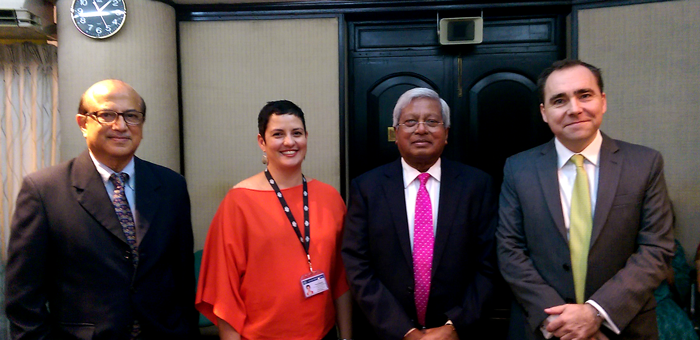
At BRAC’s Board Meeting on 3 December, Australia, BRAC and the UK reiterated their commitment to work on ending violence against women and girls in Bangladesh. This joint statement was released as part of the 16 Days of Activism against Gender Based Violence Campaign.
In issuing the statement, BRAC Chairperson Sir Fazle Abed said, “Empowering women and girls is the key to successful economic and social development. BRAC has always believed in collaborations- hence, once again, if we want to deliver real results, the government, private sector and civil societies need to work together to fight gender disparity. I am proud of the progress made in Bangladesh, but there is still work to be done.”
“Investing in girls and women has a transformative impact on growth and poverty reduction,” said Paul Whittingham, Deputy Country Representative for DFID Bangladesh. “That is why, as strategic partners, UK, BRAC and Australia support women and girls to live free from violence, and support their education, health and economic empowerment so they can achieve their full potential.”
“Our shared approach is to work with men and boys as well as women and girls to make sure that women are valued by society and from there to ensure their social and economic rights.” added Priya Powell, Counsellor (Development Cooperation) at the Australian High Commission.
With the support of Australia and the UK, BRAC’s advocacy and social and economic development programs empower women to be actively engaged in household decision making, reduce incidences of violence against women and build the confidence of students to protect and protest against sexual harassment.
The 16 Days of Activism against Gender Based Violence Campaign started on 25th November 2014 and this year the theme is “From Peace in the Home to Peace in the World: Let’s Challenge Militarism and End Gender-Based Violence". This theme is well aligned to the gender strategies of all three partners. As a part of this campaign, BRAC has organised discussion forums, rallies, poster displays and other awareness creation activities across Bangladesh. BRAC is also participating in events organised by the Government of Bangladesh and other organisations to mark this campaign.
Violence against women and girls affects a large majority of the female population, regardless of their socio-economic status. A national survey done by BBS shows that about 87% of currently married women have experienced some type of violence in their lifetime; (65% have experienced physical violence, 80% have experienced psychological violence, more than one third have experienced sexual violence, in each case, perpetrated by their intimate partners or current husbands). About one third of women have paid dowry for the current marriage. Bangladesh has the highest rate (65% of child marriage) in South Asia. A very recent survey done by ActionAid reveals that 85% of urban women and girls face some form of sexual harassment the in public domain.
Strong legislation is in place but effective implementation remains a challenge. There are other challenges around provision of support services, capacity of law enforcement agencies and having access to justice. Australia, BRAC and the UK are focused on continuing their work together to address these issues through effective programs and also developing new programs that address emerging social problems related to gender based violence.
BRAC awarded as the international charity of the year
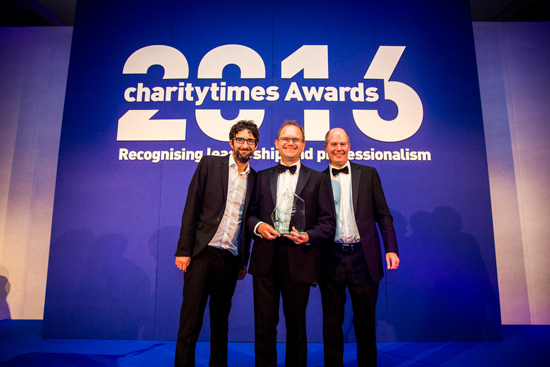
BRAC was ranked the top International Charity of the Year for 2016 by the Charity Times Awards on 28 September. The award is organised by Charity Times Magazine, a trade publication for the UK non-profit sector. Lewis Temple, CEO of BRAC UK, received the award on behalf of BRAC.
The award highlighted BRAC’s history of designing and implementing solutions at scale, particularly the ultra poor graduation approach, which helps the poorest graduate out of poverty.
The award now in its 17th year was held in London. The event works to shine a celebratory light on the sector, raise standards and offer ongoing professional development to the thousands engaged in charitable work in the UK. BRAC was pleased to share the short list for International Charity with six outstanding organisations, including Hospices of Hope, Send a Cow, Shivia, United World Schools, Vision for a Nation Foundation and Y Care International.
Charity Times is a leading business and management magazine for UK non-profit professionals. It offers a wide range of in-depth, independently-written features and news analysis. Each year, the Charity Times Awards work to honour the outstanding professionals in the varied fields of charity management; recognise, celebrate, and promote best practice; support continuing professional development; contribute to raising the standards of charity management; promote and raise the profile of the charity sector; and provide recognition for those who are providing effective support to the sector.
To know more about the awards, please visit: http://www.charitytimes.com/awards/index.php
BRAC mourns the tragic death of its official in Uganda
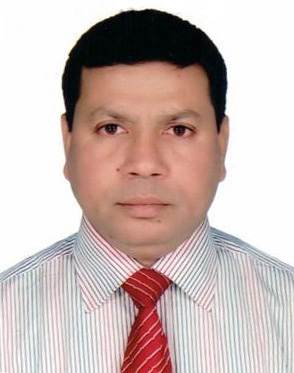
It is with great regret that we inform that Mr Md Mainuddin Ahmed (44), Senior Area Manager, Small Enterprise Programme (SEP), BRAC Uganda was killed on 27 September, 2016 by unidentified miscreants. The Uganda police post-mortem report confirmed that he died due to strangulation.
Mr Mainuddin and our service staff Mr James Aworu were found unresponsive in the area office in Lira town on 27th morning. They were immediately taken to the Lira Regional Referral Hospital where the doctors declared Mr Mainuddin deceased.
Mr Aworu was admitted in critical condition and is now out of danger.
Mr Mainuddin’s laptop and phone were missing from the office. Uganda Police has commenced the investigation, but no arrests have so far been made.
BRAC Uganda office is coordinating with the Uganda government and Bangladesh consular office in carrying out all necessary official procedures involving the incident.
BRAC has informed Mr Mainuddin’s family in Bangladesh, confirming that the BRAC family stands beside them in this hour of terrible loss. He served the BRAC Microfinance programme for 18 years. Among his dearly loved ones, Mainuddin leaves behind his wife and two sons. His permanent residence is Kollyanpur, Dhaka.
BRAC started its operations in Uganda in 2006. It has around 2400 staff, of which 98 per cent is local staff members, making it the largest NGO in Uganda. To date BRAC has served 4.4 million people, which is almost 12 per cent of Uganda’s population. To know more about BRAC Uganda please click here.
BCCM Election Notice

Bangladesh Country Coordination Mechanism (BCCM) Secretariat is coordinating and overseeing the election process of Civil Society Members and alternate members to the BCCM. Civil Society constituencies will elect their members and alternate members according to BCCM governance manual and election criteria.Organizations and individual are requested to send necessary documents to the given email address in election criteria or address below if you are eligible voter or candidate as per the constituencies criteria. You can also download the detail guideline and criteria from the website link below.
Market management crucial to lead the fight against under nutrition in Bangladesh
Research findings from LANSA-BRAC examines the relation of agriculture and nutrition
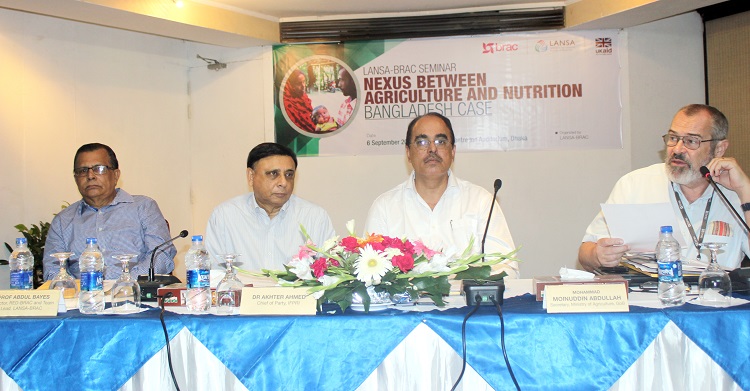
Bangladesh achieved remarkable success in alleviating poverty but lags in the field of nutrition. Presently, 7.3 million children under the age of five are stunted while 2.9 million children are undernourished. To overcome this, experts are stressing on the diversity of agricultural production and agri-food value chain beyond farm to ensure food security, and fight against under nutrition.
On Tuesday, speakers shared such findings at a seminar titled ‘Nexus between Agricultural and Nutrition: Bangladesh Case’ at the BRAC Centre in Dhaka. The seminar was organised jointly by BRAC’s research and evaluation division, and international research partnership Leveraging Agriculture for Nutrition in South Asia (LANSA) which is funded by the Department for International Development (DFID), UK.
Mohammad Moinuddin Abdullah, Secretary, Ministry of Agriculture, was present as chief guest at the seminar. Welcome speech was given by Prof. Abdul Bayes, director of research and evaluation division, BRAC. Dr Md. Sirajul Islam, programme head of BRAC's agriculture and food security programme presented findings from a research on the potential of orange-fleshed sweet potatoes in curbing under nutrition in Bangladesh. The session was led by the head of BRAC’s impact assessment unit Andrew Jenkins where International Food Policy Research Institute (IFPRI)’s Chief of Party Dr Akhter Ahmed, BRAC’s Research and Evaluation Division’s senior research fellow Barnali Chakraborty, researcher of BRAC-LANSA Dr Uttam Kumar Deb also presented papers. The presentations were followed by open discussion.
Addressing the key points of the research, Dr Md. Sirajul Islam said, “We need to focus on how the process of agri-food value chain and market distribution can be developed. That way, nutrition and food security for poor people can be ensured. This is going to be the next success of farm under food distribution management." He also mentioned that orange-fleshed sweet potato, which contains Beta-Carotene can play a vital role to preventing under nutrition problem.
Dr Akhter Ahmed said that the main objective of IFPRI's Agriculture, Nutrition, and Gender Linkages (ANGel) project in Bangladesh is to increase investment in agricultural activities and enable women to play a crucial role in curbing down under nutrition.
About nutritional wellbeing in Haor areas of the country, Barnali Chakraborty said, “Nutrition problem is extreme in Bangladesh, and 45 per cent children are stunted in the Haor areas. To prevent this situation, BRAC initiated a pilot project in 2013 in the upazila level.”
Dr Uttam Deb's paper indicated that diet diversity has increased in recent times and involvement in diversified agriculture (crop, horticulture, livestock and fish farming) contributes towards better nutrition (measured through BMI) and low income inequality.
Mohammad Moinuddin Abdullah, Secretary, Ministry of Agriculture, said, “Government has taken different initiative to develop and increase nutrition for mass people. Ministry of Agriculture is evaluating various methods for nutrition enhancement through Agriculture, Nutrition, and Gender Linkages (ANGel) project.
Join the world’s biggest family

